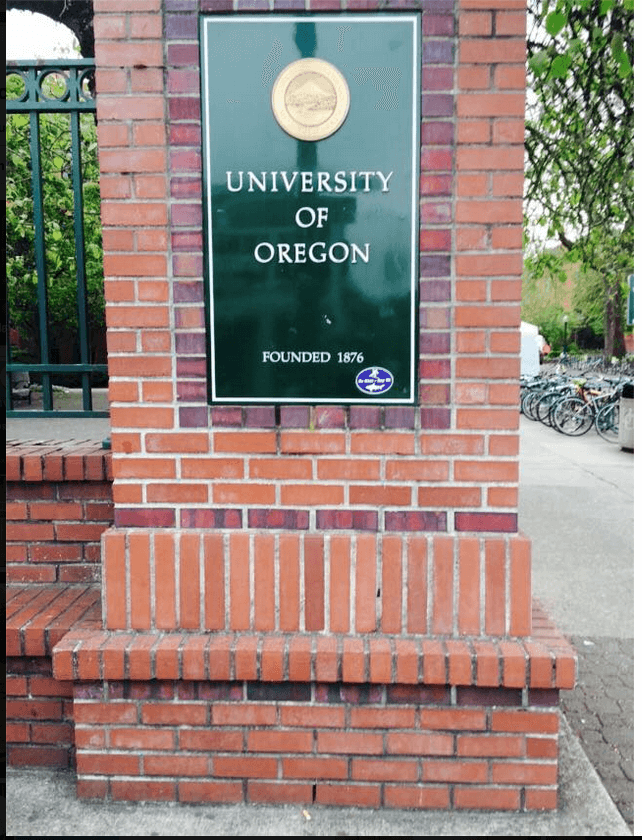I mentioned in last week’s Gin and Topics that I spent the week at the University of Oregon in Eugene as the PR Executive in Residence.
Many of you have asked what the heck that means and, other than an agenda full of going to classes, I had no idea what to expect.
Well, let me tell you…I was blown away.
I was blown away at the opportunity these kids are given at the college level.
I was blown away at the types of things they’re being taught—not just communications and journalism, but advertising, marketing, analytics, design, website creation, and more.
I was blown away at the types of work the juniors and seniors are doing for real clients.
I was blown away at their portfolios and the kind of experience they’ve gained while in school.
I was blown away at the level of real-world-ness the professors have.
And I was blown away at the level of respect the students have for faculty and vice versa.
I was ready to pack up my things, sell my business, and move west to teach.
Teaching and Observing
My job for the week was to attend classes and give the students a real-world flavor of the PR industry (and perhaps even support what their professors have been saying).
I taught:
- Blogging and writing, where we talked about things that are not unique to students, such as how to create new and interesting content, how to stay abreast of trends, and how to walk the personal and professional lines.
- The PRSSA Bateman team presented their case study to me, which was an affordable housing non-profit. I don’t know who ended up winning that national competition, but it must have been a crazy good team because what I saw was better than 99.99999 percent of any real-world campaign.
- The principles of PR, where we talked about what PR is, how it’s changing, what changes I’ve seen during the course of my career, and the best advice for someone studying the profession.
- The PR campaigns class, which is made up of mostly seniors (a few juniors). They are split into groups and they work with real clients for the quarter (10 weeks). They each presented their challenge, their objectives, and their key messages. They were just embarking on execution so we talked about what they expected to achieve. I saw everything from a climate change to roller derby.
- Strategic ethics, where we talked about everything from #UpForWhatever and Penn State to Deflate Gate and the “domestic abuse” video shown at halftime during the Cavs/Bulls game the other night. The class submitted questions ahead of time and we had a 90 minute conversation about how to stand up for your ethics when you just being your career.
- The strategic social media class, which also submitted questions ahead of time. Each student who asked a question—and they did their homework because some asked me about blog posts I wrote a long time ago—asked it live and then we had a conversation about it in real-time.
I also had the opportunity to have lunch with six PR student leaders, with four faculty, and I gave my formal Spin Sucks presentation.
Students Can Teach Us All
I also learned a ton. I learned:
- Where you go to school DOES matter. I didn’t have these kinds of opportunities when I was in college and I know not every school offers the chance to take business and analytics and marketing and design classes. If you are in school (or thinking about going back), find a school that will let you do this. It makes a huge, huge difference.
- The kids coming out of this program will kick our butts. You think the industry has changed a lot in the last five or six years, it’s going to change even more when they enter the workforce. Measurement will be required. Strategy will need to be thought-out. Visual and auditory content will be necessary. You will have to change or your job will become extinct.
- The things that matter to them don’t matter to the rest of us (not at the same level) and that is going to change the way we all do business. While I realize I was in Eugene, Oregon and that makes a bit of a difference, the things you hear about what Millennials care about—cause marketing, non-profits, the environment—I saw first-hand. They’re not money hungry like my generation. They want to do good in the world.
- Ethics is a huge part of their education and they are very concerned about working for organizations that have a great moral compass. So, while I personally and this blog both have critics; critics who say it’s impossible to do PR ethically, this will be demanded by the next generation. And that makes me gleeful.
- The tools we use now, including Wikipedia and email, will become extinct. I was surprised at how little email is used and how inaccurate they believe Wikipedia is, so they just don’t use it.
PR Executive in Residence Thanks
It was a crazy, busy week and I came home exhausted, but exhilarated.
I want to thank Kathyrn Kuttis, Kelli Matthews, Dave Remund, Connie Chandler, and Tiffany Gallicano for inviting me into their classes and letting me have full-reign.
Kathryn and Kelli were instrumental in my being there so a special thanks to both of them.
I also met some amazing students whose names I’m almost afraid to give you for fear you may snatch them up before I can:
- Kayla Gordon
- Nick Hanlin
- Sophie Wenet
- Abigaelle Mulligan
- Savannah Fox
- Jessica Glackin
- Annabelle Carberry
If you ever have the opportunity to create this kind of program because you teach or if you are invited to participate, I highly, highly recommend it.
I came back a better professional because of my experience.
Go Ducks!
